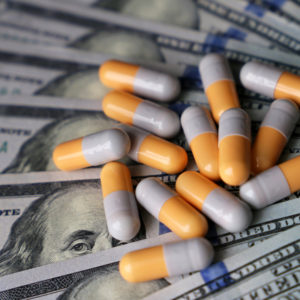Unnecessary price hikes on just seven prescription drugs cost Americans more than $5 billion a year, says the advocacy group Institute for Clinical and Economic Review (ICER), which recently released a report highlighting drugs with extraordinary — and in their view, unjustified — price increases.
The seven drugs are Humira (which treats arthritis and Crohn’s disease), Rituxan (which treats several types of cancer and autoimmune diseases), Lyrica (which treats fibromyalgia and seizures), Truvada (which treats, but doesn’t cure, HIV and AIDS), Neulasta (which helps cancer patients recover white blood cells after chemotherapy), Cialis (which treats erectile dysfunction and hypertension), and Tecfidera (which treats multiple sclerosis).
ICER conducts cost-effectiveness analyses on drugs to determine whether or not they’re worth going to market given their cost. In other words, if the cost-effectiveness ratio of a drug is too high, ICER will recommend against it going to market, even if it could improve or save patients’ lives.
Sometimes, ICER will pressure a drug company to lower the price of its drug if there isn’t enough clinical evidence to support the high price tag, and sometimes ICER will recommend a drug company raise the price of a drug if it would dramatically improve patients’ quality of life or even save their lives.
Traditionally, drugmakers raise prices of drugs that have been on the market awhile only if there is new clinical evidence or improvements to the drug to prove its increased value. Sometimes, drugmakers justify price hikes by arguing that the additional revenue goes toward new research to improve the drug, especially if the drug is near the end of its lifecycle (this is the R&D argument, which many health care experts and economists say is a bogus argument given drug companies’ fat profit margins).
Between 2016 and 2018, drugmakers hiked the prices of four of those seven drugs by at least 20 percent, increasing U.S. drug spending by more than $5 billion.
“There’s no real new evidence [to justify these price hikes],” David Whitrap, ICER’s Vice President of Communications told InsideSources. “This is just waste in the system. We’re paying more for these treatments without any additional benefit. For just these seven treatments, Americans are paying $5.1 billion more than they would if the prices stayed the same. And I think that’s something policymakers would be really interested in.”
Both Democrats and Republicans in Congress are fighting to come to some sort of compromise on drug price legislation. Both parties agree drug prices are far too high and prevent patients from receiving life-saving treatments. Furthermore, the leading cause of bankruptcy in the U.S. is medical debt.
Companies raise prices on successful drugs that have been on the market a long time largely due to high demand. If the drug works and works well, doctors will prescribe it regularly and the industry will see an opportunity to make more money off patients who need it.
“We want to be able to afford these new drugs that are coming to market, but the only way the American taxpayer system can afford that new treatment that saves people’s lives, is if we stop overpaying for these treatments that have been on the market for a long time and are highly profitable for companies,” Whitrap said. “If there’s no evidence to support these price increases, maybe the system could allocate those dollars in better ways.”
So far, only one drug price reform bill has passed a committee in Congress: the Senate Finance Committee’s bipartisan Prescription Drug Pricing Reduction Act of 2019 (PDRPA), which specifically targets Medicare. The Congressional Budget Office estimates the bill would reduce Medicare deficits by $100 billion over a decade.
The bill would also cap out-of-pocket spending on drugs at $3,100 a year, and requires drugmakers to pay a 20 percent rebate on drugs for those who reach that cap. Another provision in the bill would directly reduce the prices of some drugs and save the U.S. $68 billion over a decade.
The committee revised the bill after the pharmaceutical industry blitzed Congress with lobbying dollars over the summer. (Senate Finance Committee members are some of the top Big Pharma recipients.)
House Speaker Nancy Pelosi’s drug price control bill would require drug companies and the Department of Health and Human Servies to negotiate the prices of drugs without at least two competitors. The federal government would penalize drugmakers that fail to negotiate prices. Drug companies oppose her bill because it would cut into their profit margins, but has also given hundreds of thousands of dollars to Pelosi.
“They’re making their own decisions for their shareholders,” Whitrap said of the pharmaceutical industry. “We have a situation in the United States that allows them to make whatever price increase they want, and that eventually becomes unsustainable, and no other country does that. That’s why in the United States we pay more for these treatments and our health outcomes are not as good as what occurs in other countries.”

